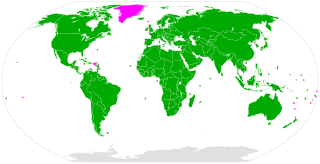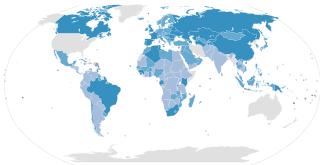| C167 | |
|---|---|
| ILO Convention | |
| Date of adoption | June 20, 1988 |
| Date in force | January 11, 1991 |
| Classification | Construction |
| Subject | Occupational safety and health |
| Previous | Repatriation of Seafarers Convention (Revised), 1987 |
| Next | Employment Promotion and Protection against Unemployment Convention, 1988 |
Safety and Health in Construction Convention, 1988 is an International Labour Organization Convention.
It was established in 1988, with the preamble stating:
Having decided upon the adoption of certain proposals with regard to safety and health in construction,...
As of April 2024, the convention had been ratified by 34 states.
| Country | Date | Status |
|---|---|---|
| Albania | 24 Apr 2014 | In Force |
| Algeria | 06 Jun 2006 | In Force |
| Belarus | 21 Nov 2001 | In Force |
| Belgium | 08 Jun 2016 | In Force |
| Bolivia | 10 Feb 2015 | In Force |
| Brazil | 19 May 2006 | In Force |
| China | 07 Mar 2002 | In Force |
| Colombia | 06 Sep 1994 | In Force |
| Czech Republic | 01 Jan 1993 | In Force |
| Denmark | 10 Jul 1995 | In Force |
| Dominican Republic | 04 Jun 1998 | In Force |
| Finland | 23 Jan 1997 | In Force |
| Gabon | 28 Jul 2015 | In Force |
| Germany | 18 Nov 1993 | In Force |
| Guatemala | 07 Oct 1991 | In Force |
| Guinea | 25 Apr 2017 | In Force |
| Hungary | 22 May 1989 | In Force |
| Iraq | 17 Sep 1990 | In Force |
| Italy | 12 Feb 2003 | In Force |
| Kazakhstan | 18 Jun 2008 | In Force |
| Lesotho | 27 Jan 1998 | In Force |
| Luxembourg | 08 Apr 2008 | In Force |
| Mexico | 05 Oct 1990 | In Force |
| Mongolia | 05 Nov 2020 | In Force |
| Montenegro | 18 Sep 2015 | In Force |
| Norway | 24 Jun 1991 | In Force |
| Panama | 31 Jan 2008 | In Force |
| Russia | 29 Oct 2018 | In Force |
| Serbia | 16 Sep 2009 | In Force |
| Slovakia | 01 Jan 1993 | In Force |
| Sweden | 07 Oct 1991 | In Force |
| Turkey | 23 Mar 2015 | In Force |
| Uruguay | 25 May 2005 | In Force |
| Uzbekistan | 09 Jun 2022 | In Force |

The International Maritime Organization is a specialised agency of the United Nations responsible for regulating maritime transport. The IMO was established following agreement at a UN conference held in Geneva in 1948 and the IMO came into existence ten years later, meeting for the first time on 17 March 1958. Headquartered in London, United Kingdom, the IMO currently has 176 Member States and three Associate Members.
The International Convention for the Safety of Life at Sea (SOLAS) is an international maritime treaty which sets out minimum safety standards in the construction, equipment and operation of merchant ships. The International Maritime Organization convention requires signatory flag states to ensure that ships flagged by them comply with at least these standards.

The Convention Concerning the Prohibition and Immediate Action for the Elimination of the Worst Forms of Child Labour, known in short as the Worst Forms of Child Labour Convention, was adopted by the International Labour Organization (ILO) in 1999 as ILO Convention No 182. It is one of eight ILO fundamental conventions.

The ILO Convention Concerning Minimum Age for Admission to Employment C138, is a convention adopted in 1973 by the International Labour Organization. It requires ratifying states to pursue a national policy designed to ensure the effective abolition of child labour and to raise progressively the minimum age for admission to employment or work. It is one of eight ILO fundamental conventions. Convention C138 replaces several similar ILO conventions in specific fields of labour.
Protection against Accidents (Dockers) Convention, 1929 (shelved) is an International Labour Organization Convention.
Protection against Accidents (Dockers) Convention (Revised), 1932 is an International Labour Organization Convention.
Occupational Safety and Health Convention, 1979 is an International Labour Organization Convention.
Occupational Safety and Health Convention, 1981 is an International Labour Organization Convention, number 155.
Occupational Health Services Convention, 1985 is an International Labour Organization Convention.
Chemicals Convention, 1990 is an International Labour Organization Convention.
Safety and Health in Mines Convention, 1995 is an International Labour Organization Convention. It was adopted at the 82nd International Labour Conference (ILC) of the International Labour Organization (ILO). The ILO is an agency under the United Nations that deals with international labor issues while promoting workers rights and opportunities. One of ILO's goals is to hold annual labor conventions to create legally binding contracts for participating nations to ratify. During the Safety and Health in Mines Convention (C176), it was recognized that there are inherent hazards in the mining workplace, and a need for a convention was mandatory.
Home Work Convention, created in 1996, is an International Labour Organization (ILO) Convention, which came into force in 2000. It offers protection to workers who are employed in their own homes.
Safety and Health in Agriculture Convention, 2001 is an International Labour Organization Convention.
Work in Fishing Convention (2007) C 188, was adopted at the 96th International Labour Conference (ILC) of the International Labour Organization ILO in 2007. The objectives of the Convention is to ensure that fishers have decent conditions of work on board fishing vessels with regard to minimum requirements for work on board; conditions of service; accommodation and food; occupational safety and health protection; medical care and social security. It applies to all fishers and fishing vessels engaged in commercial fishing operations. It supersedes the old Conventions relating to fishermen.
Maritime administrations, or flag state administrations, are the executive arms/state bodies of each government responsible for carrying out the shipping responsibilities of the state, and are tasked to administer national shipping and boating issues and laws within their territorial waters and for vessels flagged in that country, or that fall under their jurisdiction.

The Maritime Labour Convention (MLC) is an International Labour Organization (ILO) convention, number 186, established in 2006 as the fourth pillar of international maritime law and embodies "all up-to-date standards of existing international maritime labour Conventions and Recommendations, as well as the fundamental principles to be found in other international labour Conventions". The other pillars are the SOLAS, STCW and MARPOL. The treaties applies to all ships entering the harbours of parties to the treaty (port states), as well as to all ships flying the flag of state party (flag states, as of 2021: over 91 per cent).
International labour law is the body of rules spanning public and private international law which concern the rights and duties of employees, employers, trade unions and governments in regulating Work and the workplace. The International Labour Organization and the World Trade Organization have been the main international bodies involved in reforming labour markets. The International Monetary Fund and the World Bank have indirectly driven changes in labour policy by demanding structural adjustment conditions for receiving loans or grants. Issues regarding Conflict of laws arise, determined by national courts, when people work in more than one country, and supra-national bodies, particularly in the law of the European Union, have a growing body of rules regarding labour rights.
The Convention on Nuclear Safety is a 1994 International Atomic Energy Agency (IAEA) treaty that governs safety rules at nuclear power plants in state parties to the convention.
The Convention for the Suppression of Unlawful Acts against the Safety of Civil Aviation is a multilateral treaty by which states agree to prohibit and punish behaviour which may threaten the safety of civil aviation.

The right to sit refers to laws or policies granting workers the right to be granted suitable seating at the workplace. Jurisdictions that have enshrined "right to sit" laws or policies include Mexico, France, Spain, Argentina, the United Kingdom, Jamaica, South Africa, Eswatini, Cameroon, Tanzania, Uganda, Lesotho, Malaysia, Brazil, Israel, Ireland, Zambia, Guyana, the Indian states of Tamil Nadu and Kerala, the Canadian province of Newfoundland and Labrador, and the British overseas territory of Gibraltar and Montserrat. Almost all states of the United States and Australia, as well as the majority of Canadian provinces passed right to sit legislation for women workers between 1881 and 1917. US states with current right to sit legislation include California, Florida, Massachusetts, Montana, New Jersey, New York, Oregon, Pennsylvania, West Virginia, and Wisconsin. A right to sit provision is included in the International Labour Organization's Hygiene Convention, 1964; the international treaty being ratified by 52 countries as of 2023. EU-OSHA recommends suitable seating as a best practice. Local jurisdictions with right to sit laws include Portland, Oregon, St. Louis, Missouri, and London's Royal Borough of Kensington and Chelsea.